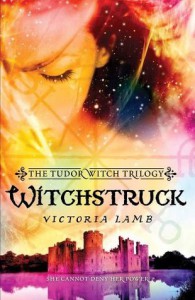Ashleigh Paige
I'm a full-time college sophomore pursuing my B.A. in English with hopes of one day working as an editor. Cats, musicals, documentaries about cults/disasters/tragedies, and curse words are just a few of my favorite things. Also, check out our blog or I WILL FIND YOU.
Review: Witchstruck by Victoria Lamb

See more of my reviews on The YA Kitten! My copy was an ARC I received from the publisher via NetGalley.
Witchcraft alongside the intrigue of Tudor-era England sounds fun, right? According to most of the reviews, it is. I can agree with that! Sadly, the most entertaining elements of Witchstruck fall by the wayside and can do very little to redeem this ultimately frustrating novel.
Most Tudor-era YA historicals are set during King Henry VIII’s reign, but Lamb sets it during Princess Elizabeth’s confinement in 1555/1556. I honestly thought this was AU at first because I had no idea about it! A good Tudor-era scholar I am not. Despite the frustrations that slowly built up as the novel went on, it’s easy to care a lot about where Meg and her story are going, especially since female friendships/the powers and rights of women are thoroughly emphasized. Most of the characters are merely okay, but Elizabeth shines in all of her appearances. If only it were the same for Meg and Alejandro, our main characters.
Alejandro is by far the more grating of the two as he falls in love with Meg over the course of 70 pages and a handful of conversations. After that, a choppy time-skip tells us Meg has gotten closer to him, she loves how he’s such a good conversationalist, etc. and we’re expected to take this poor relationship development as-is. Not in this house! The development he gets closer to the end is appreciated, but it’s not enough to make up for everything that bothers me about his character.
Meg is the textbook “okay” heroine. She has something of a personality, she doesn’t hate other women, she’s admirably loyal to Princess Elizabeth, and all the mistakes she makes are forgivable. Sounds good, right? Yet her heavily flawed first-person narration makes it easy to let the flaws of the prose reflect back on her.
One of her worst narrative sins is how maddeningly repetitive she is. She thoroughly details why she hates Marcus Dent twice in a single chapter and tells us a few details about a person but then proceeds to repeat those few details about them almost every single time they come up. It almost seems like she thinks the reader has about as much memory as a dead bird. As if we could easily forget Marcus is a cruel, wealthy man and Joan is the simple girl who called Meg a witch after bringing them up so many times!
The ending’s deus ex machina with Meg’s sudden superwitch powers after surprisingly little witchery beforehand eased few of my issues and doesn’t encourage me to stick around for Witchfall. It’s easy to recommend to fans of Jessica Spotswood’s books and anyone who unabashedly loves witches, but others may want to be cautious.
 1
1





